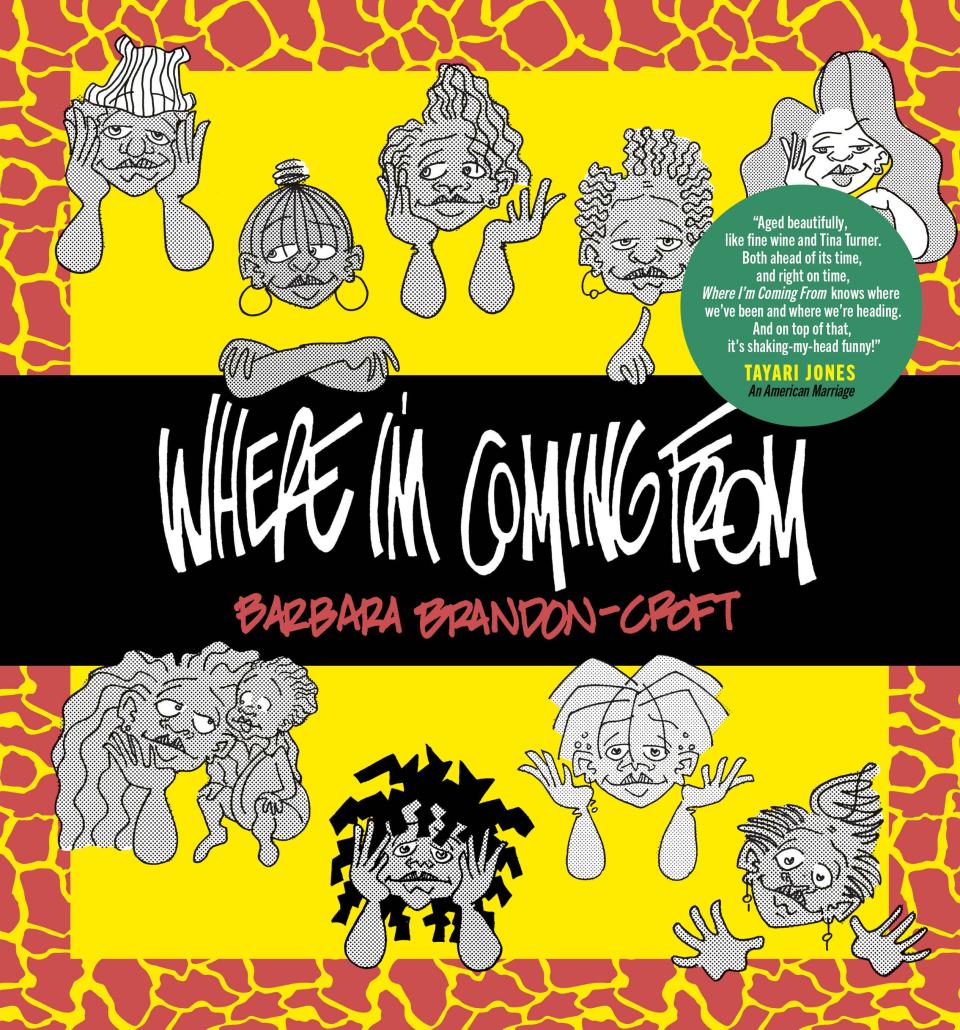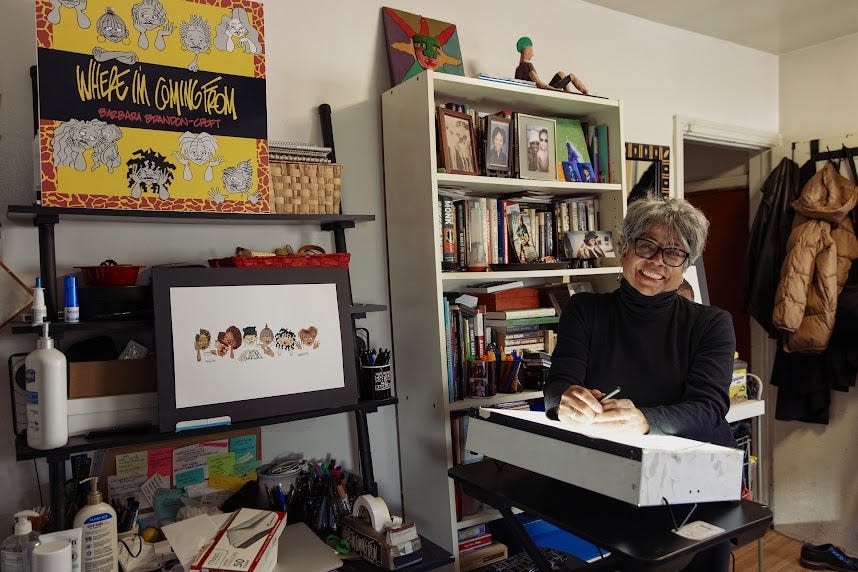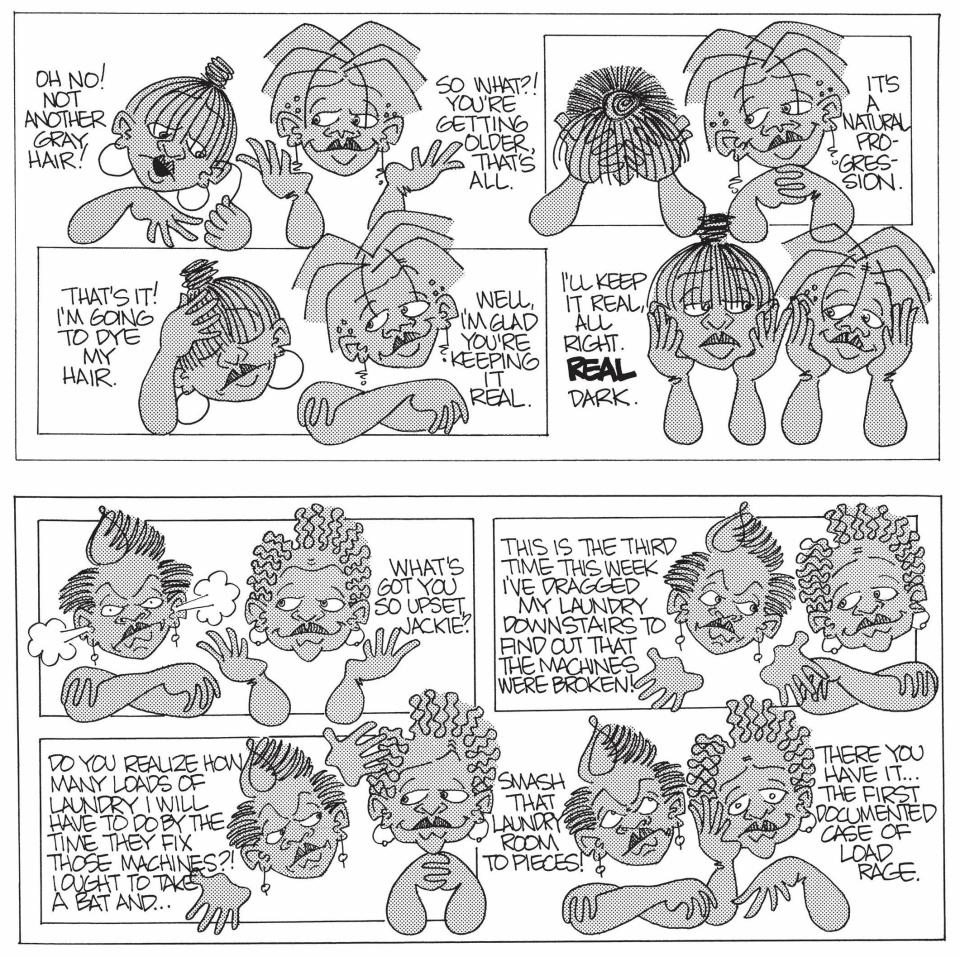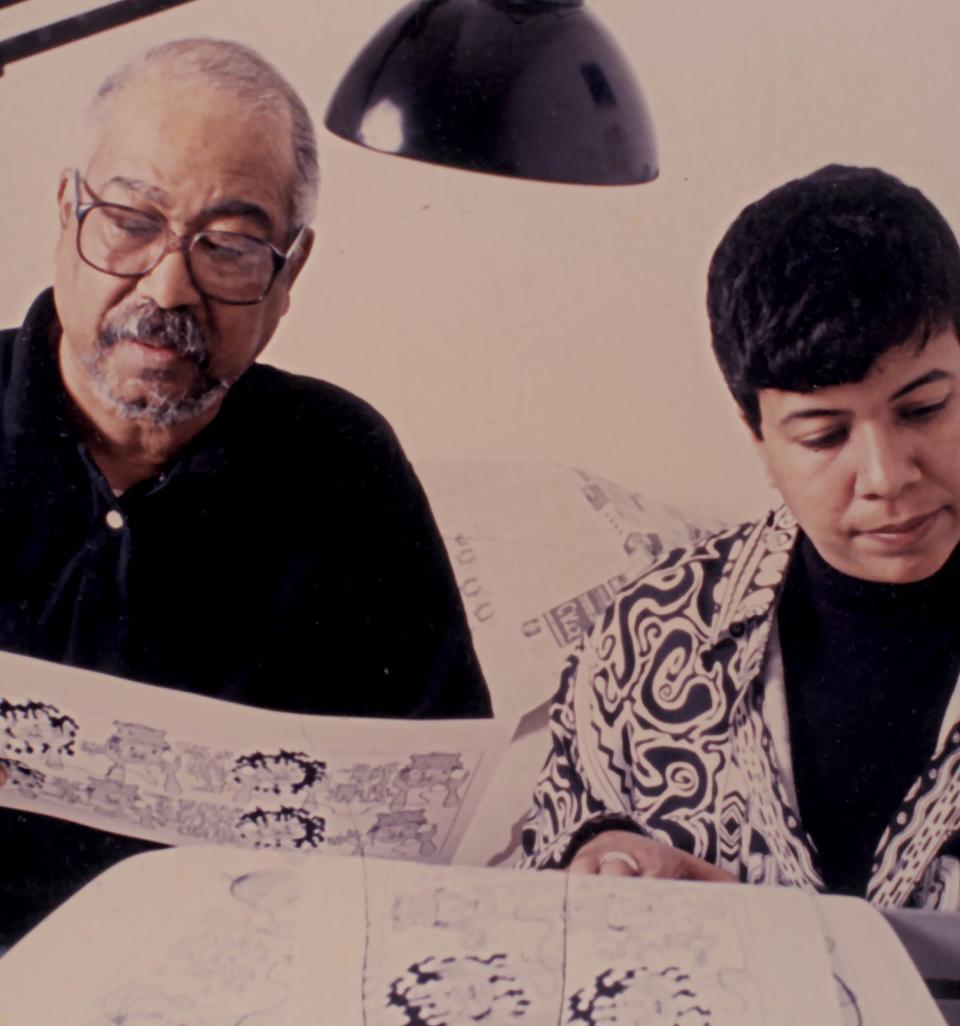Barbara Brandon-Croft was 1st Black woman with nationally syndicated comic strip
In 1989, Barbara Brandon-Croft quit her job as a fashion reporter to pursue being a full-time cartoonist after the Detroit Free Press was the first to run her comic strip "Where I'm Coming From." Two years later, the New York native became the first nationally syndicated Black woman cartoonist.
Today, at 64, her comic strips continue to speak to many as they follow the everyday struggles of nine Black women. "Where I'm Coming From" ran for 17 years, was revived on Instagram in 2017 and has now been turned into a book by Canadian publisher Drawn and Quarterly.

Through her work, she is able to express what Black Americans are feeling, Brandon-Croft said. Readers have felt very connected to the characters, "who are speaking the same truth that they understand."
The efforts of a former Free Press managing editor, Marty Claus, aided in Brandon-Croft's syndication — as they both pushed for more diversity and representation in comics.

First seen in the Detroit Free Press
In the 1980s, "we were trying to do a better job throughout the Free Press of representing the complete community we served," Claus said. "I was in charge of the comics as well as other categories."
As most comics in newspapers are provided by feature syndicates, Claus reached out to multiple syndicates, highlighting the need for cartoonists of color, not just in Detroit, but across the country, she said. After not seeing much improvement, Claus began writing established cartoonists of color, asking for their help in finding the right candidate to create diverse comics for the Free Press.
One of the cartoonists she reached out to was Brumsic Brandon Jr. — Brandon-Croft's father. He created "Luther," one of the first nationally syndicated comic strips featuring an African American lead, running from 1968-1986.
More: Neal Rubin: ‘Dilbert’ has been discarded — but not canceled
After receiving the Free Press letter, Brandon-Croft said she remembers her father turning to her and asking, "Are you going to be a cartoonist or are you just going to talk about being a cartoonist?" She quickly took action and sent in her first edition of "Where I'm Coming From" to Claus.
"'Where I’m Coming From' landed on my desk in 1989 — not just showcasing people of color but giving voice to women with opinions and humor and personality," Claus said. The comic strip was featured in the Free Press' lifestyle section every Sunday, which was called "The Way We Live."
For the first time, at 30, Brandon-Croft began working as a cartoonist, discussing relationships, sexism and racism from the point of view of nine Black women: Cheryl, Nicole, Jackie, Lydia, Judy, Alisha, Lekesia, Monica and Sonya.

The community sought and felt the comic strip
Free Press readers responded positively to "Where I'm Coming From" and sent the newspaper and Brandon-Croft many encouraging letters.
Claus said the following comments were directly pulled out of some of the letters received at the time:
"Your Sunday comic is funny, on target, and often truthful part of the Free Press."
"Every Sunday I can't wait to see what aspect of my life will be profiled for all to see. It is also so nice to see African American images regularly instead of just during Black History Month."
"You really know what's going on with the mind of Black women and men. My friends say this comic was made just for me because I say a lot of the things your character says. Keep up the great work."
Rejected by all syndicates, except 1
In 1989, soon after being published in the Free Press without any syndication, Brandon-Croft set out to become syndicated and Claus backed her up along the way.
"Because I had a father who was a nationally syndicated cartoonist, I knew a thing or two about what needed to happen," Brandon-Croft said.
She put together a press kit of her published comic strips, along with audience feedback, a feature story the Free Press wrote on her at the time, and a letter that put syndicates "on blast," Brandon-Croft said. The letter stated that there have been very few Black cartoonists, since the 60s, that have been nationally syndicated —none of them have been Black women— and so here she is, independently published and ready to be syndicated.
"And it worked! I mean I got rejected by everybody, except for one," she said. "But it did work. All you need is one and Universal Press was the one that was interested."
Universal Press Syndicate picked up Brandon-Croft in 1991, making her the first Black woman cartoonist to ever be nationally syndicated. Her work was featured in the Free Press until the late 1990s and her syndication ended in 2005, but "Where I'm Coming From" was revived on Brandon-Croft's Instagram in 2017 and she continues to release new strips to this day.
Inspired by her father, Brumsic Brandon Jr.
"I had my dad as a role model all my life, watched him draw, used his pens, his paper," Brandon-Croft said. "I've even assisted my dad, so I was kind of in training to be a cartoonist."

In high school, Brandon-Croft helped her father apply color to his comic strips using Zip-A-Tone. She was the clear successor to Brandon Jr. after she won a test he gave her and her brothers to see who had the steadiest hand.
"Of course, I won," she said "My brother, who's a science guy, his lines were very shaky. The drawing he did was pretty hilarious and we kept it up on the wall for a long time to laugh at it, and him."
'I had no idea I wanted to be a cartoonist'
Even after helping her father with his "Luther" comic strips, attending Syracuse University's College of Visual and Performing Arts, and holding several publication positions, Brandon-Croft did not see herself as a cartoonist, but she did know she wanted to be in the visual arts field.
It wasn't until 1982, in her 20s, that she realized she might be able to follow in her father's footsteps. The realization came during a job interview for a magazine she was applying to called Elan.
More: I-375 project in Detroit could mean big changes — but some wonder who will benefit
The editor-in-chief "said to me, 'You're kind of funny. You draw. Do you think you could do a comic strip?' That's when the light bulb went off over my head," Brandon-Croft said.

She created "Where I'm Coming From" for Elan, but the company folded before the comic strip was published. Brandon-Croft went on to work for Essence as a fashion reporter for over five years, but continued illustrating cartoons to accompany her stories from time to time before her work was published in the Free Press years later.
"Lots of her panels say things that I think only a Black woman can say with authority," Claus said. "But lots of her panels say things all the women have thought at one time or another — sometimes about men, sometimes about politics, sometimes about their friends."
Coming to Detroit on April 27
Brandon-Croft will be at Source Booksellers in Detroit on April 27, kicking off her book tour and promoting "Where I'm Coming From" in an interview with Danielle Eliska, a local award-winning writer, film director, photographer, entrepreneur and educator. The event starts at 7 p.m. Further details can be found here.
A signed edition of "Where I'm Coming From" can be purchased here.
Contact Nour Rahal: nrahal@freepress.com
This article originally appeared on Detroit Free Press: Barbara Brandon-Croft's cartoon 'Where I'm Coming From' now a book

